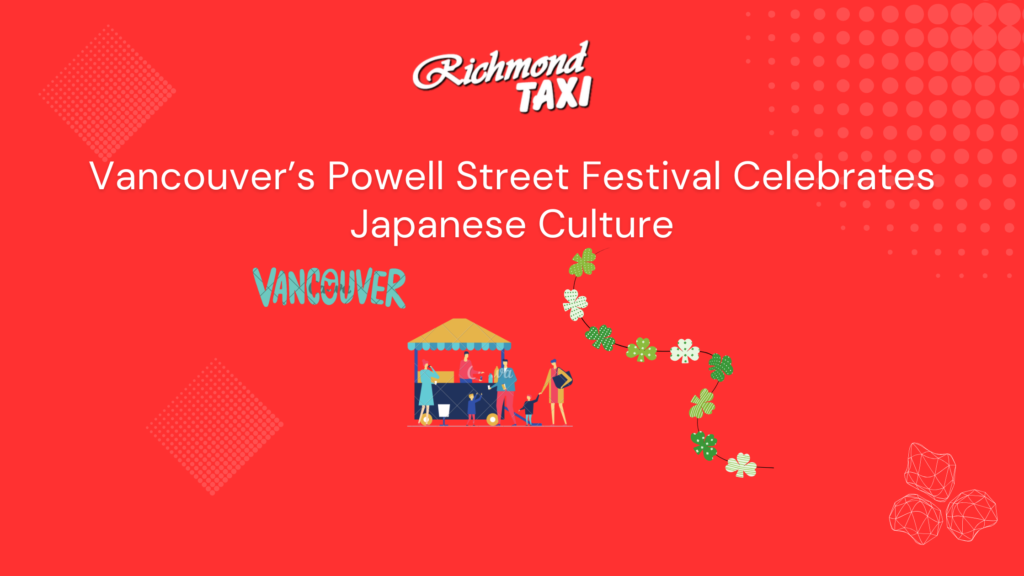Vancouver’s Powell Street Festival Celebrates Japanese Culture

Vancouver is a city rich in multiculturalism, and among its many vibrant traditions, the Powell Street Festival stands out as a heartwarming tribute to Japanese heritage. Held annually in the lively Powell Street area, this cherished celebration draws thousands of visitors and locals who come together to honour Japanese culture, history, and community spirit. Whether you’re a cultural enthusiast, a foodie, a history buff, or simply looking for something meaningful to do during the summer, the Powell Street Festival is one of the must-see Vancouver summer festivals. Here’s everything you need to know about this iconic event. A Festival with Deep Roots The Powell Street Festival has been an integral part of Vancouver’s cultural landscape since 1977. Originally started by Japanese Canadians in the Powell Street area—once home to Vancouver’s Japantown—the festival was created to celebrate and preserve the traditions and stories of the Japanese community. Over the years, this grassroots initiative has grown into one of Canada’s largest and longest-running festivals celebrating Asian culture. Despite its size and success, it has remained true to its community-oriented, inclusive roots. A Cultural Showcase Like No Other At the core of the Powell Street Festival is a deep appreciation for the beauty and richness of Japanese culture in Vancouver. From traditional art forms like taiko drumming, calligraphy, and origami to contemporary music, dance, and theatre, the event showcases a perfect blend of old and new. Some key highlights include: Taiko Drumming Performances – These high-energy, synchronized drumming acts are both visually and sonically stunning. Martial Arts Demonstrations – Experience the discipline and power of karate, kendo, and judo performed by skilled practitioners. Cultural Workshops – Visitors can join in on hands-on workshops like ikebana (flower arranging), tea ceremonies, and Japanese calligraphy. Film and Literary Events – Contemporary Japanese and Japanese Canadian voices are featured through film screenings, book readings, and panel discussions. These performances and events aren’t just entertainment—they offer powerful insights into the values and artistry of Japanese culture. Food, Crafts, and Local Vendors No festival is complete without a feast, and the Powell Street Festival certainly delivers. With food stalls lining the streets, you’ll find authentic Japanese street food like takoyaki (octopus balls), yakisoba (fried noodles), gyoza, and sweet treats like mochi and kakigori (shaved ice). Beyond food, the festival features numerous craft vendors and artisan stalls selling handmade goods, Japanese textiles, artwork, ceramics, and unique gifts. It’s a great place to support local businesses while picking up something beautiful and meaningful. Celebrating the Japanese Community in Vancouver The Powell Street Festival is more than just a summer celebration—it’s a living testament to the legacy of the Japanese community in Vancouver. The Powell Street area, once the hub of Japanese Canadian life before WWII, now serves as a historic reminder of the resilience and contribution of this community. Through its programming, the festival honours past injustices, such as the internment of Japanese Canadians, while also uplifting modern voices and movements within the community today. Visitors leave not only entertained but also educated and inspired by the stories shared. A Free and Inclusive Summer Event One of the best parts about the Powell Street Festival is that it’s completely free to attend. It’s open to people of all ages and backgrounds, making it a truly inclusive event. Held at Oppenheimer Park and the surrounding blocks of Powell Street, the festival creates a welcoming space where diversity is celebrated, and culture is shared joyfully. It’s a fantastic opportunity for families, students, tourists, and residents to experience the depth of Japanese heritage without having to leave the city. Sustainability and Community First The festival also takes pride in its commitment to sustainability and community wellbeing. Organizers emphasize eco-friendly practices such as composting, recycling, and encouraging visitors to bring their own reusable dishes and utensils. Volunteers, local artists, community elders, and youth all come together to make the event possible—truly making this one of the most community-driven Japanese community events in Vancouver. Getting There: Make Travel Easy Since the event takes place in the heart of Vancouver, parking can be limited. Taking public transport or booking a cab is highly recommended. For those traveling from nearby cities, especially Richmond, it’s worth booking in advance for a smooth ride. If you’re attending the Powell Street Festival and looking for a reliable ride, book your trip with Richmond taxi for hassle-free, comfortable transportation. Conclusion The Powell Street Festival is more than a weekend event—it’s a heartfelt tribute to the Japanese community and a joyful celebration of cultural diversity in Vancouver. With its mix of tradition, modern creativity, and strong community values, it continues to inspire, educate, and entertain thousands each year. So mark your calendar, invite your friends, and don’t miss out on one of the most meaningful Vancouver summer festivals. Whether you come for the food, the music, the history, or the atmosphere, the Powell Street Festival promises an experience that lingers far beyond the summer. For your ride to the Powell Street Festival, choose the comfort and reliability of Richmond taxi. FAQs Q1: When is the Powell Street Festival held each year?A: The Powell Street Festival typically takes place on the first weekend of August. Exact dates and performance schedules are available on the official website a few weeks prior to the event. Q2: Is the Powell Street Festival kid-friendly?A: Absolutely! The festival offers numerous kid-friendly activities including craft workshops, storytelling, and safe play zones. It’s a perfect event for families looking for a cultural summer outing.


